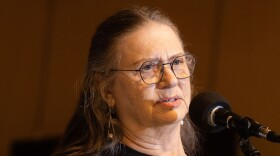There are many barriers that prevent Black and brown people from accessing mental health services — like the stigma that's attached to seeking help, lack of transportation, affordability and the lack of Black and brown therapists. But Black Space in Milwaukee is hoping to help change that.
Founded by Dr. Lia Knox, Darius Smith and Corey Fells, Black Space offers free, group therapy sessions to help normalize seeking professional help for mental health issues.

Since September 2020, Black Space has held sessions at No Studios in downtown Milwaukee, focusing on groups of Black and brown men, women and LGBTQ people. Smith says that for many men, there is a stigma around speaking up about mental health issues in fear of being judged by those around them.
“A lot of the men in the spaces go on like a tirade with just a ball of emotions of the things they wish they were able to tell their partners, their friends or whoever it may be. It’s never just one thing, it’s like just life,” he explains.
Knox says they put a lot of work into making sure that the atmosphere of Black Space is inviting and comfortable enough for people to be emotionally vulnerable.
They play music, provide food and cover the walls in artwork. Knox says she also makes it clear to each group that she is just there to facilitate and that the group are the ones in control.
“People would say that Black and brown people do not want to go to therapy, and they are not interested — absolutely they are,” she says. “When you supply a safe space, they will come. It’s just how many safe spaces do we have here?”
But Black Space isn’t just about serving people individually, Fells says expressing emotion in the group setting is a form of community building and can help participants connect with others who have shared experiences.
Going forward, he says the plan for Black Space is to design sessions that can be taken outside of No Studios and implemented in different settings, from other community organizations to corporate training.
“This type of session where it’s deeply rooted for Black and brown individuals to be able to have this, you know, therapeutic experience,” he says.
Their goal is to help reach more people and make them feel comfortable searching for help with their mental health.
“We are always, first and foremost, taking care of our community, making sure that they’re cared for properly, ethically and making sure that these group therapy experiences are just opening the doors and giving them that experience so that they can then go out and find their therapist,” Knox says.
Do you have a question about race in Milwaukee that you'd like WUWM's Teran Powell to explore? Submit it below.
_







